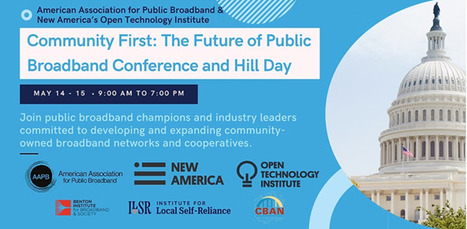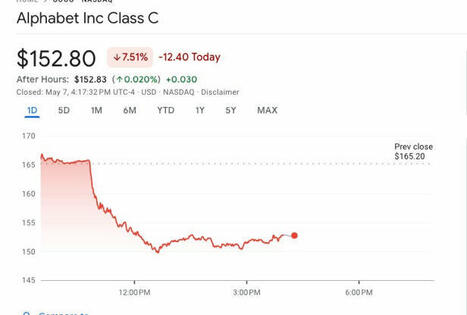 Your new post is loading...
 Your new post is loading...
Trump wants to eliminate an essential broadband-access program so the government can redirect billions into Elon Musk’s pockets via his Starlink satellite-internet service.
In this urgent episode of the podcast, Angela Siefer and Amy Huffman join us to respond to President Trump’s declaration that the Digital Equity Act is “unconstitutional.” We break down what the Act actually does—and what’s at stake for millions of Americans if it disappears.
“Who Broke the Internet?” is a new podcast from CBC Understood that I host and co-wrote — it’s a four-part series that explains how the enshitternet came about, and, more importantly, what we can do about it. Episode one is out this week: https://www.cbc.ca/listen/cbc-podcasts/1353-the-naked-emperor/episode/16144078-dont-be-evil The thesis of the series — and indeed, of my life’s work — is that the internet didn’t turn to shit because of the “great forces of history,” or “network effects,” or “returns to scale.” Rather, the Great Enshittening is the result of specific policy choices, made in living memory, by named individuals, who were warned at the time that this would happen, and they did it anyway. These wreckers are the largely forgotten authors of our misery, and they mingle with impunity in polite society, never fearing that someone might be sizing them up for a pitchfork. “Who Broke the Internet?” aims to change that.
One of the most heavily touted benefits of good broadband is that it enables people to work from home. One might think that the ability to work from home has largely been solved since broadband speeds around the country have been climbing. But it seems like I’m on a Teams or Zoom call every week…
The Schools, Health & Libraries Broadband (SHLB) Coalition, the American Library Association, All4ed, Wireless Future at New America, and Common Sense Media expressed strong disappointment following the Senate’s passage of S.J. Res. 7, a Congressional Review Act resolution that overturns the Federal Communications Commission’s (FCC) decision to allow E-rate funding for Wi-Fi hotspot lending by schools and libraries.
WASHINGTON, April 10, 2025 – Groups recommended for digital equity grants from the federal government have not been notified of a pause on funds, according to two people familiar with the matter. Those entities did receive notice that travel related to diversity efforts would not be an allowable expense, the people said.
The fixed wireless access (FWA) services from T-Mobile, Verizon and AT&T have been enormously popular, but there's a ceiling to the sector's growth. Finding it is a challenge.
Some of the nation’s leading voices, thinkers, and doers in the community broadband sector will connect and collaborate in the nation’s capital for the inaugural "Community First: The Future of Public Broadband Conference and Hill Day" next week. The two-day conference – slated for May 14 and 15 – is being hosted by the American Association for Public Broadband (AAPB) and New America Open Technology Institute (OTI), in partnership with the Community Broadband Networks Initiative at the Institute for Local Self-Reliance (ILSR), the Benton Institute for Broadband & Society, and the Community Broadband Action Network.
Consolidated Communications has announced a strategic fiber deployment to support a Houston data center's operation.
A $4.3 million investment by GoNetspeed will result in 6,700 locations throughout Ansonia, Connecticut gaining access to the ISP's network.
A disconnection notice has been sent to Accelecom customers in Kentucky following the state's cancellation of their contract in January.
Today, Wall Street finally noticed antitrust risk to Google and Apple, worried that their monopoly profits are nearing an end. Analysts are even saying Google should break itself up.
The world has been abuzz for weeks now about the inclusion of a journalist in a group message of senior White House officials discussing plans for a military strike. In that case, the breach was the result of then-National Security Advisor Mike Walz accidentally adding The Atlantic Editor-in-Chief Jeffrey Goldberg to the group chat and no one else in the chat noticing. But what if someone controlling or hacking a messenger platform could do the same thing? When it comes to WhatsApp—the Meta-owned messenger that’s frequently touted for offering end-to-end encryption—it turns out you can. A clean bill of health except for ...
|
Carr is intent on making an end-run around long-established rules, all to deliver more political favors to a president for whom legal procedures mean nothing.
A recent tell-all by a Facebook insider reveals the insidious nature of Facebook's advertising empire, and the dangerous consequences.
SpaceX said it has data showing EchoStar is barely using its Boost 5G network. EchoStar, meanwhile, claims SpaceX is trying to 'usurp critical resources from a competitor.'
When I work with business owners, one of my favorite questions to ask is: "What are the lurking issues in your business?" It’s a simple question, but it often reveals challenges that are quietly brewing beneath the surface—challenges that don’t get the attention they deserve. Succession planning is
WASHINGTON, May 8, 2025 – The Senate just voted to repeal a Federal Communications Commission rule allowing schools and libraries to use federal broadband funds to lend Wi-Fi hotspots for off-campus use. House companion effort led by Rep. Fulcher expected to move next.
WASHINGTON, May 8, 2025 – After more than 100 days of official silence about the status of digital equity grant funding, President Donald Trump on Thursday afternoon said that the government would be "ending this immediately" and cancelling what he called a $2.5 billion "giveaway."
In this episode of the podcast, Chris sits down again with Evan Feinman to share what it took to launch the biggest broadband investment in U.S. history. He reflects on what went right, what still worries him, and why local leadership is key to getting it right.
Legislation that would require ISPs operating in Massachusetts to offer qualifying low-income households high-speed Internet service for $15 per month is set to have its first legislative hearing today. The hearing in Massachusetts comes as similar legislation is being considered by state lawmakers in Vermont and California – all three of which are modeled on New York’s Affordable Broadband Act.
The development is part of All West's ongoing commitment to enhance connectivity across Sweetwater County in Wyoming.
Over 28,000 homes and businesses in the city of Warren, Ohio have gained access to Brightspeed's fiber-optic internet, according to the ISP.
Charter, Rogers Communications, and CableLabs have collaborated on a new technology they are calling new radio over coax (NRoC). The immediate goal of the new technology is to use a cable company’s coaxial network to transmit 5G signals. In Charter’s case, the company wants to use new bandwidth to take advantage of Charter’s CBRS spectrum.…
As AI increases the already extensive role of communications networks in enabling Americans to participate in the economy and civic life, will policy ensure equitable and inclusive access to the tools necessary to thrive online? Current debates over current broadband policies, as well as diversity, equity, and inclusion (DEI) policies, send mixed signals. President Donald Trump and his allies’ constantly blame diversity, equity, and inclusion (DEI), without evidence, for tragic events––such as plane crashes, wildfires, and bridge collapses. And on Inauguration Day, the administration issued an executive order ending funding related to “illegal DEI and ‘diversity, equity, inclusion, and accessibility’ (DEIA) mandates, policies, programs, preferences, and activities in the Federal Government, under whatever name they appear.” But will Trump end former President Joe Biden's largest DEI program? No. That program is the $42.5 billion Broadband Equity, Access, and Deployment (BEAD) Program. Congress created it in the 2021 Infrastructure Investment and Jobs Act to bring high-speed internet networks to every home and business in America currently unserved by such networks. And while the Trump Commerce Department and Republicans in the House have proposed changes to BEAD, they are not calling for its end.
|






 Your new post is loading...
Your new post is loading...



























